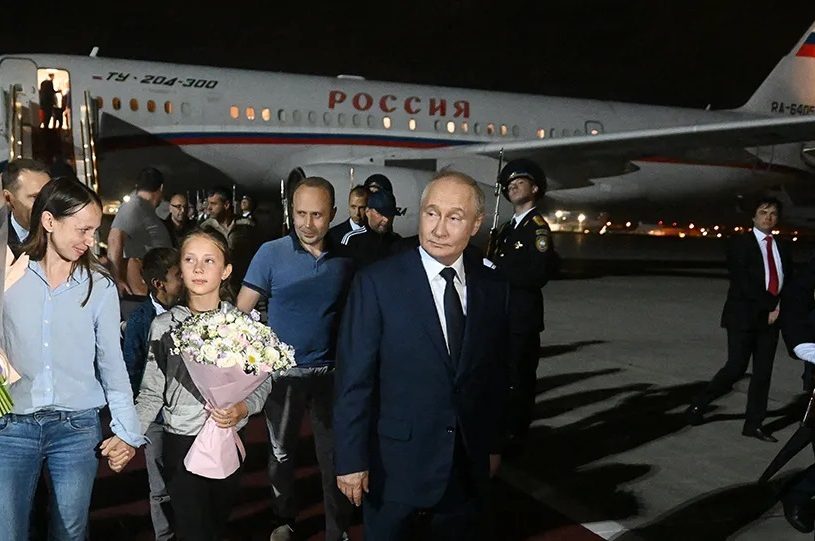In June 2022, Vladimir Putin tipped up at a party at the headquarters of Russia’s foreign intelligence service, the SVR. This was to mark, of all things, the centenary of the country’s program of deep-cover spies, who live for years abroad under elaborate false identities while passing secrets back to their masters at home. The weirdness of that espionage hoopla, just four months after the invasion of Ukraine, leaves one wondering what other bizarre birthday events Putin might have in his diary. The 85th anniversary of the assassination of Leon Trotsky, perhaps? Ah, you can imagine the banter. The cracker hats. The roll-out noisemakers.
Yet it’s not out of the question – as we learn from this thrilling book by the journalist Shaun Walker, which grabs you by the lapels from the very first page. It recounts the 100-year history of the covert Russian agents known in the SVR as “illegals” (as opposed to the spies thinly disguised as diplomats abroad, the “legals”). The murder of Trotsky in Mexico in August 1940, when an ice-pick was planted in the back of his head, was one of the proudest triumphs of the illegals program.
Ironically, Trotsky’s early life as an outlaw Bolshevik, creeping about the capitals of Europe under various aliases, would foreshadow and inspire the illegals. Consider the time Lenin and the gang met up in a pub in Islington, claiming to be a convention of foreign barbers. There’s a direct line from here to the outlandish adventures of Dmitry Bystrolyotov, the most colorful of the characters whose stories Walker tells. He was a handsome fellow with a raffish moustache who at different times passed himself off as a Dutch artist, a Greek businessman, an English aristocrat and a Canadian timber merchant.
It was as a Hungarian count that Bystrolyotov pulled off his greatest coup when, in the early 1930s, he befriended and blackmailed a British Foreign Office mole named Ernest Oldham. The Soviet smoothie managed this partly by bedding his wife, Lucy, while Ernest was in rehab. According to a report sent by an eager colleague to the SVR, Bystrolyotov had no sooner turned up at Lucy’s home in Kensington, when, “with the spirited gesture of a port-town girl, she hoisted up her dress, opened her legs and begged him not to waste any time.”
Racy stuff, but it’s unclear how much of it to believe. Inevitably, a lot of this book’s material comes courtesy of career liars. This doesn’t make Bystrolyotov’s story, which is largely based on his eye-popping memoirs, any less enjoyable. Here he is on the demands of deep-cover work:
If you pose as a herring salesman, you should be able to tell one herring from another. A Norwegian herring. A bloater. You should learn how a herring salesman moves and talks. You should reek of herring.
I would have loved to ask Bystrolyotov how a herring salesman moves.
I wonder, too, how he felt, after years of loyal service, to be arrested in Russia, tried and tortured as a traitor, and then consigned to the gulag for 15 years. One revelation here is that the success of the illegals left Stalin convinced the West must be carrying out similar operations. His resulting paranoia was one of the engines of the Great Purge.
It turned out that Stalin was wrong. MI6 and the CIA got going later than the SVR and never built a comparable program of illegals. Walker’s gloriously mundane explanation for this is that it was precluded by the Soviet obsession with bureaucracy. Most likely, any deep-cover CIA agent would have got busted within minutes of entering Russia.
The author of The Illegals, Shaun Walker, who has spent many years as Russia correspondent for the Independent and Guardian, is particularly sensitive to the human cost of the illegals program. Some of its victims attempted suicide. Some succeeded. The perpetrators themselves cracked up or turned to booze. Their children, several of whom Walker has interviewed, are still processing the trauma of discovering that much of what their parents told them was total fiction.
Meanwhile, he raises serious concerns about the operations of the illegals program today. During Putin’s early years at the KGB, he worked as an illegals support officer, and he retains a “fondness for the program.” One consequence of the war in Ukraine has been the withdrawal from Europe of Russian diplomats, including the legals mentioned earlier. That has created a massive intelligence shortfall. The result? Russia now needs its illegals more than ever. According to Walker, that is why, in the speech Putin made at that SVR party three years ago, he raised a glass not only to the illegals of the past but also to those who “right now are carrying out unique operations” around the globe.


























Leave a Reply